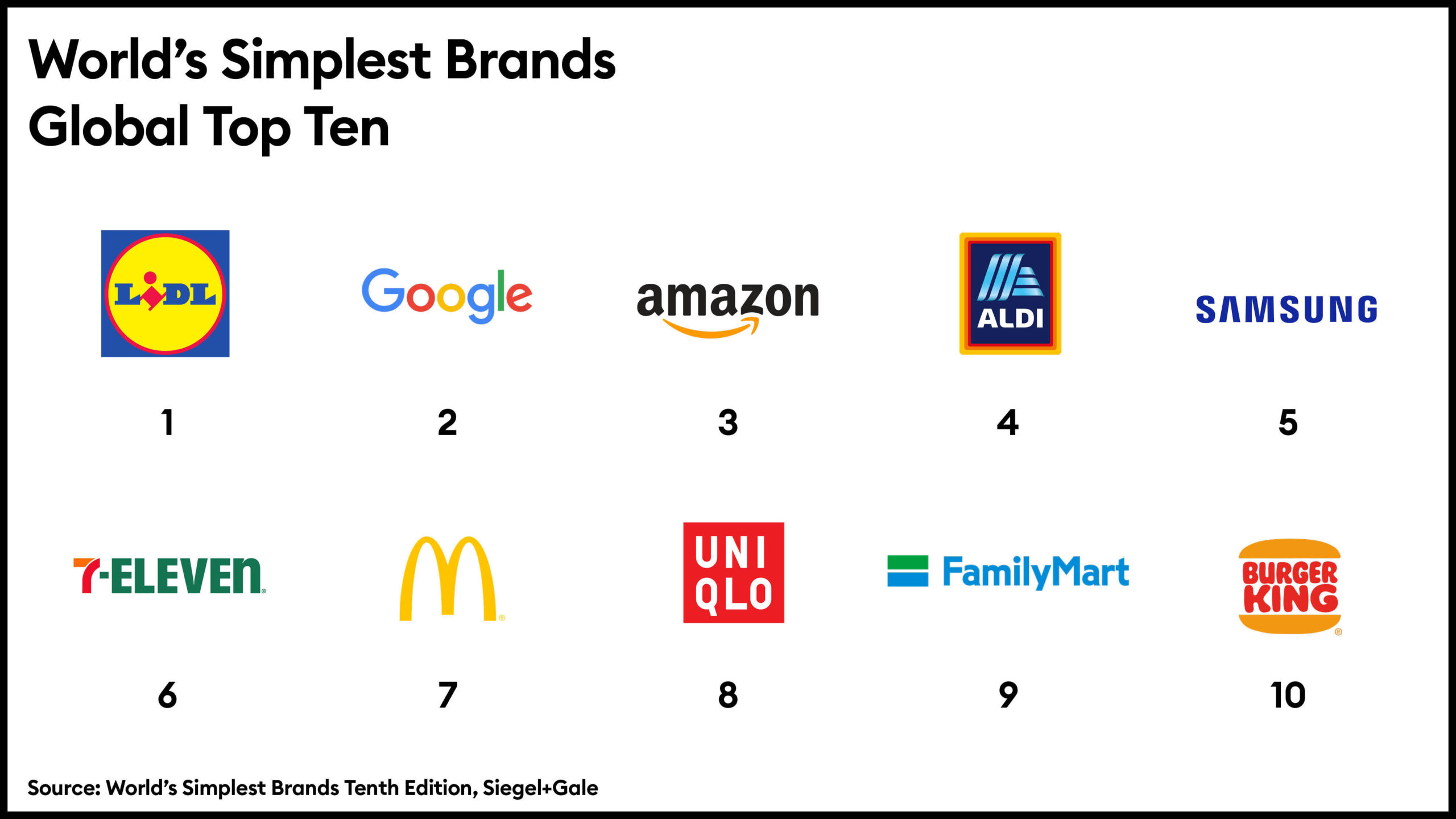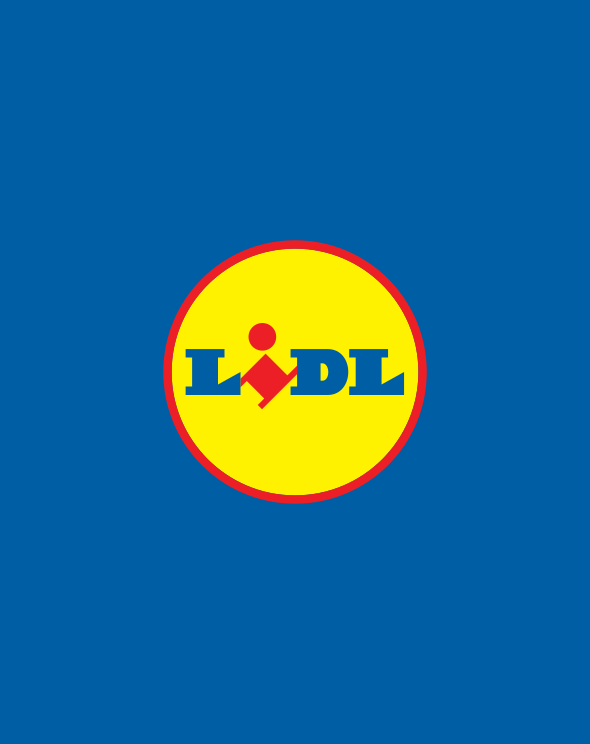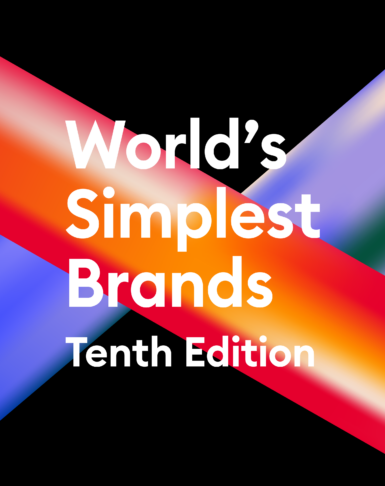This article originally appeared in Little Black Book.
The launch of Instagram and Uber. 500M WeChat users. 100M TikTok downloads. 1B wearable-tech users. 1M ChatGPT users. More than half of the U.S. using contactless payments.
These are only some of the many ways the ubiquity of mobile, the proliferation of consumption channels, and the mass adoption of social media have manifested since the advent, in 2010, of Siegel+Gale’s World’s Simplest Brands study, which surveys 15,000+ people across nine countries about the perceived simplicity and complexity of 800+ brands and 25 industries.
Many disruptive brands that have dominated this period of innovation have harnessed simplicity to propel their meteoric rises. Yet, because of abundance—of content, of channels, of products—consumers continue to experience complexity.
And they revealed it to be so. The 2023 World’s Simplest Brands study found that 64% of consumers are willing to pay more for simpler experiences, and 78% of consumers are more likely to recommend a brand because it provides simpler experiences and communications.
The world over, simple experiences have the following characteristics: easy to understand; transparent and honest; caring for and meeting people’s needs; innovative and fresh; and useful.
Globally, the top-performing brands traverse industries and business models. Several of them are veterans of this distinguished arena. For instance, this year’s winner, Lidl, has been in the Top 10 in six editions. And Google has an admirable record: top three in nine editions. Others, 7-Eleven and FamilyMart, are newcomers.
It’s apparent that delivering simplicity to consumers requires intentional business decisions. It’s worth keeping an eye on the brand-experience decisions these ranking rookies and seasoned simplifiers are implementing.

1. Lidl
The German discount retailer Lidl is simplifying healthy, sustainable eating for generations to come. Lidl has introduced kid-friendly fruit-and-vegetable packaging to encourage kids to notch up their nutrient intake. They’ve also committed to removing cartoon characters from all “unhealthy” products by spring 2024. But these cuisine commitments won’t be the only root of Lidl’s success. Just as the brand has done for fifty years, Lidl needs to continue to produce high-quality items, low prices, and simple shopping experiences.
2. Google
Making their mark in the top three for the ninth consecutive edition, the tech leader Google embodies simplicity. Now, the future of Google search is coming into focus through SGE (Search Generative Experience): the new AI-driven search-engine results page. In this new era of search, Google aspires to continue to provide users with simple experiences by unlocking a world of information faster.
3. Amazon
Selling everything from hammocks to HDMI cables to hoverboards, the e-commerce giant Amazon added a new offering: healthcare. Amazon’s acquisition of primary-care practice One Medical aims to simplify the often-fraught experience, aspiring to make it easier to find, choose, afford, and engage with healthcare. Effective, accessible virtual care services, on-site labs, and an array of healthy-living programs promote physical and mental health. Amazon might write the prescription for painfully complex healthcare experiences.
4. Aldi
With 90% of their products private label, the German grocer ALDI simplifies the shopping experience by limiting the paradox of choice. Don’t spend hours debating which tomato sauce to buy. Instead, trust that ALDI will deliver high quality and low prices so you can just grab a can and go. And this fall, look out for their seasonal maple-, pumpkin- and cinnamon-stocked shelves in one of the 120 new ALDI stores opening in 2023. To reinforce the brand’s sustainability commitment, new stores will be equipped with eco-friendly features, including adding solar panels and eliminating plastic shopping bags.
5. Samsung
Samsung continues to take its place at the frontline of innovation with an eye to simplicity. Take the Galaxy Z Fold 5 and Flip 5. By urging consumers to defy norms and enjoy new experiences on the “flip side,” this electronics corporation challenges everything people know about ordinary smartphones. Even as the mobile phone market declines, the foldable phone sector continues to grow—and other tech companies are beginning to follow suit. The future might be foldable; it’s as simple as that.
6. 7-Eleven
The convenience-store chain 7-Eleven keeps simplicity well stocked. Supplying everything from snacks to magazines to gas, the smorgasbord store simplifies any experience. By cancelling any complexity, 7-Eleven isolates brain freeze to their iconic icy treat: the Slurpee. 7-Eleven has added new foods, including a Korean BBQ taquito—which might satisfy the need for simple, cross-cultural experiences.
7. McDonald’s
The fast-food chain McDonald’s famous golden arches are going green, thanks to a goal to have 100% of products in recycled or renewable materials by 2025. For consumers and employees alike, easy-to-understand initiatives like this simplify McDonald’s sustainability mission. And simplicity spans packaging to patties. Rather than super sizing their menu options, McDonald’s has upgraded classics with softer buns, gooier cheese, and richer condiments.
8. UNIQLO
Enhancing user experience is woven into the fabric of UNIQLO. In response to consumer feedback, the Japanese retailer crafted UV-protection clothes and anti-fog sunglasses. These tailor-made tweaks model their mission to deliver clothing that enriches the lives of all consumers around the world. And UNIQLO is known for collaborations with designers. This fall, UNIQLO debuted aesthetic alliances with French designer Ines de le Fressange, as well as tennis legend Roger Federer by way of U.K. fashion label JW Anderson—as if doubles partners! By making high-end designs accessible, UNIQLO is banking on sartorial simplicity always being on trend.
9. FamilyMart
As a one-stop shop for all necessities, the Japanese convenience-store chain FamilyMart keeps life simple. And their enhanced fashion products set them apart from a typical corner store. With new apparel items geared towards all ages, like unisex shorts and sandals, the FamilyMart brand has got you covered—from head to toe. The combination of universal designs and convenience might be one blueprint for simplicity.
10. Burger King
Burger King takes their seat on the throne, providing royally tasty and conveniently simple consumer experiences. Offering over 200,000 ways to uniquely customize their signature Whopper—whether it’s through pickles for crunch, jalapeños for spice, or barbecue sauce for tang—Burger King adds personal flair to their fast-food franchise. And with their two-year commitment to investing in restaurant tech, this type of customization is simple and satisfies those salty cravings.
Complexity is compounding in every sector. There will be more content, more channels, more products—in short, more decisions. But decisions won’t be limited to consumers; rather, brands will have to make decisions too.
Brands have the choice to allocate their dollars to fund everything from business acquisitions to marketing programs to product innovations. The top-performing brands apply a lens of simplicity to help prioritize where to invest. They embody a simplicity mindset and operationalize successfully and at an admirable scale.
The brands in the Global Top 10 show that simplicity isn’t destiny or a part of DNA; rather, simplicity is the product of a series of decisions. And, when brands decide to be simple, they are rewarded handsomely by consumers the world over.
Margaret Molloy is Global Chief Marketing Officer



